Versuche niemals herauszufinden, wie zwei Personen in einer arabischen Familie miteinander verwandt sind, es sei denn, du bist bereit, einer langen und detaillierten Genealogie-Lektion zuzuhören, die sich irgendwie über mehrere Generationen und mindestens drei Cousins erstreckt. Ein einfaches „Onkel“ oder „Cousin“ reicht nie aus – jede Antwort kommt mit einer kurzen Familiengeschichte, und bis sie fertig sind, hast du vielleicht sogar vergessen, warum du überhaupt gefragt hast. 😅
In der arabischen Kultur geht es bei Familie nicht nur um nahe Verwandte; sie ist ein weites, vernetztes Gefüge, in dem jeder scheinbar jeden kennt – oder es zumindest vorgibt. 🙂 Familienbande sind nicht nur biologischer Natur, sondern bilden eine soziale Struktur, die Beziehungen und Interaktionen beeinflusst. Es spielt eine Rolle, ob jemand über die mütterliche oder väterliche Linie verwandt ist, ob er älter oder jünger ist – dies spiegelt sich in den präzisen Anredeformen wider. Zum Beispiel sind die Begriffe für „Onkel“ und „Tante“ weitaus spezifischer als in vielen anderen Sprachen und ändern sich je nach Familienzweig und Position innerhalb der Familienhierarchie. Der Respekt vor Älteren ist besonders wichtig, weshalb ein jüngerer Bruder sogar „kleiner Vater“ (Abu X) genannt werden kann oder ein älteres Geschwisterkind einen Titel erhält, der Ehre und Status ausdrückt.
Wenn du Arabisch Mutter und Arabisch Vater lernen möchtest, ist es am besten, mit den Grundlagen zu beginnen. Arabisch Mutter ist أم (Umm), während Arabisch Vater أب (Ab) ist. Von hier aus entfaltet sich ein ganzes System, in dem jeder Verwandte je nach seiner genauen Position in der Familie einen eigenen Namen hat. Wenn du wissen möchtest, wie Araber ihre Familienmitglieder ansprechen – und vermeiden willst, versehentlich einen Fremden „Onkel“ zu nennen – dann lies weiter! 😃
If you want to deepen your knowledge of Arabic, try the PixiLearn Arabic learning app, where you can learn Arabic words and phrases in a fun and interactive way. Download it now and start learning! Learn Arabic words with PixiLearn
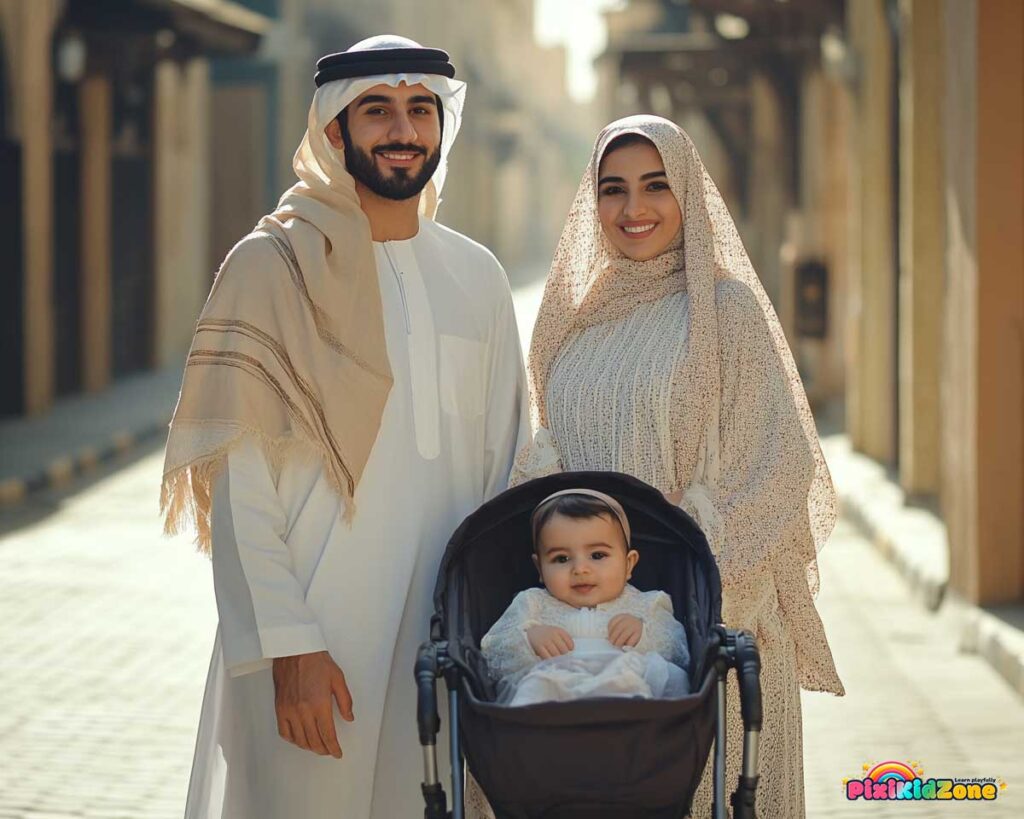
Arabisch Mutter und Arabisch Vater
Arabisch Mutter – أم (Umm)
Im Arabischen lautet das Wort für Mutter أم (Umm) und wird als „Omm“ ausgesprochen.
Mütter spielen in der arabischen Kultur eine zentrale Rolle und werden oft als das Herz der Familie angesehen. Die arabische Sprache spiegelt diesen tiefen Respekt durch liebevolle Titel wider, wie „Umm + Name des erstgeborenen Kindes“, wobei eine Mutter manchmal mit dem Namen ihres ältesten Kindes angesprochen wird, zum Beispiel Umm Ahmed (Mutter von Ahmed).
Arabisch Vater – أب (Ab)
Das arabische Wort für Vater ist أب (Ab) und wird als „Ab“ ausgesprochen.
In der arabischen Kultur werden Väter traditionell als das Oberhaupt des Haushalts angesehen, verantwortlich für Führung und Unterstützung. Wie Mütter erhalten auch Väter Ehrentitel, üblicherweise „Abu + Name des erstgeborenen Kindes“, wie zum Beispiel Abu Khalid (Vater von Khalid), was ihre Rolle und Stellung innerhalb der Familie symbolisiert.
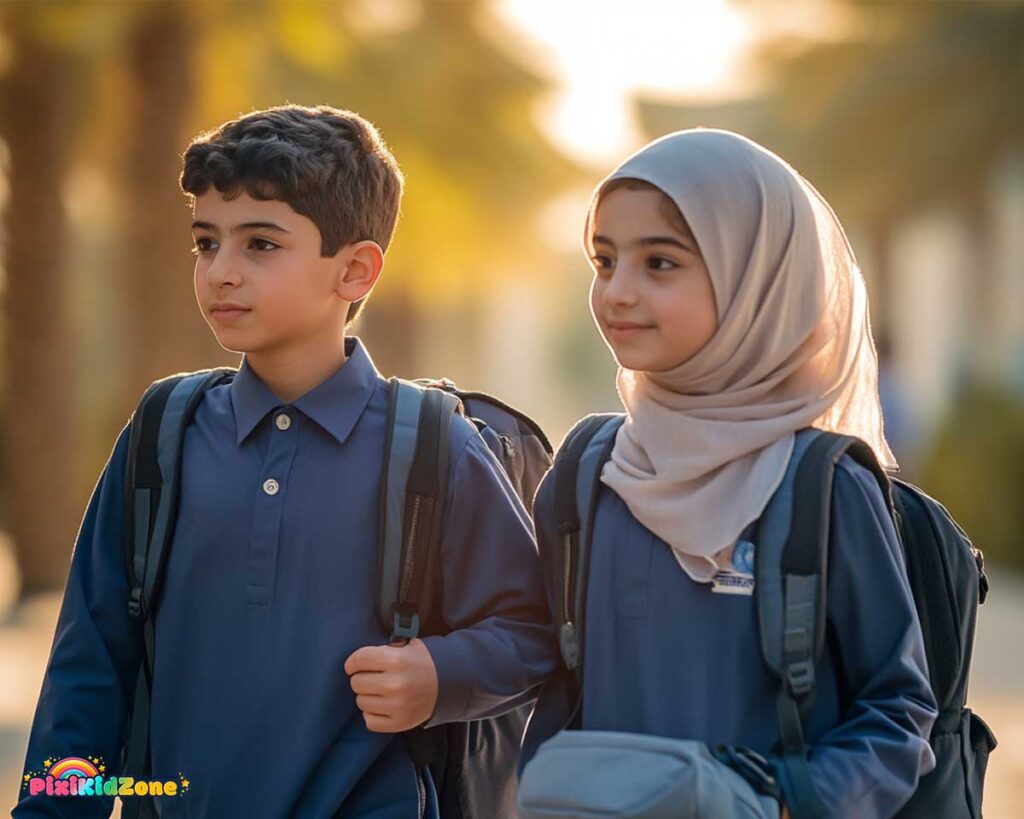
Arabisch Sohn und Arabisch Tochter
Arabisch Sohn – ابن (Ibn)
Im Arabischen lautet das Wort für Sohn ابن (Ibn), und wird in bestimmten Dialekten als “Ibn” oder “Bin” ausgesprochen.
Der Begriff Ibn wird nicht nur in alltäglichen Familiengesprächen verwendet, sondern erscheint auch in historischen und formellen Kontexten, wie zum Beispiel in Namen (Ibn Sina, was Sohn von Sina bedeutet). In der traditionellen arabischen Gesellschaft werden Söhne oft als Träger des Familiennamens und Erbes angesehen.
Arabisch Tochter – بنت (Bint)
Das arabische Wort für Tochter ist بنت (Bint) und wird als „Bint“ ausgesprochen.
Im Gegensatz zu Ibn, das oft in vollständigen Namen verwendet wird, erscheint Bint in Abstammungsbezeichnungen, wie „Bint Ali“, was „Tochter von Ali“ bedeutet. Historisch gesehen wurde der Begriff in Adelsfamilien verwendet, um die Herkunft zu betonen. In vielen arabischen Haushalten nehmen Töchter einen besonderen Platz ein und erhalten oft liebevolle Spitznamen.
Arabic Word for Brother and Sister
Brother in Arabic – أخ (Akh)
In Arabic, the word for brother is أخ (Akh), pronounced as “Akh” (with a soft “kh” sound, like the German “Bach”).
In Arab culture, the bond between siblings is highly valued. An older brother (Akh Kabeer – أخ كبير) often takes on a protective and guiding role within the family, while younger brothers (Akh Sagheer – أخ صغير) are expected to show respect and follow their elders’ advice.
Sister in Arabic – أخت (Ukht)
The Arabic word for sister is أخت (Ukht), pronounced as “Ukht”.
Sisters hold a special place in Arab families, often taking on nurturing roles. An older sister (Ukht Kabeera – أخت كبيرة) is traditionally viewed as a second mother, offering guidance and care, while younger sisters (Ukht Sagheera – أخت صغيرة) are usually pampered and protected by their siblings.
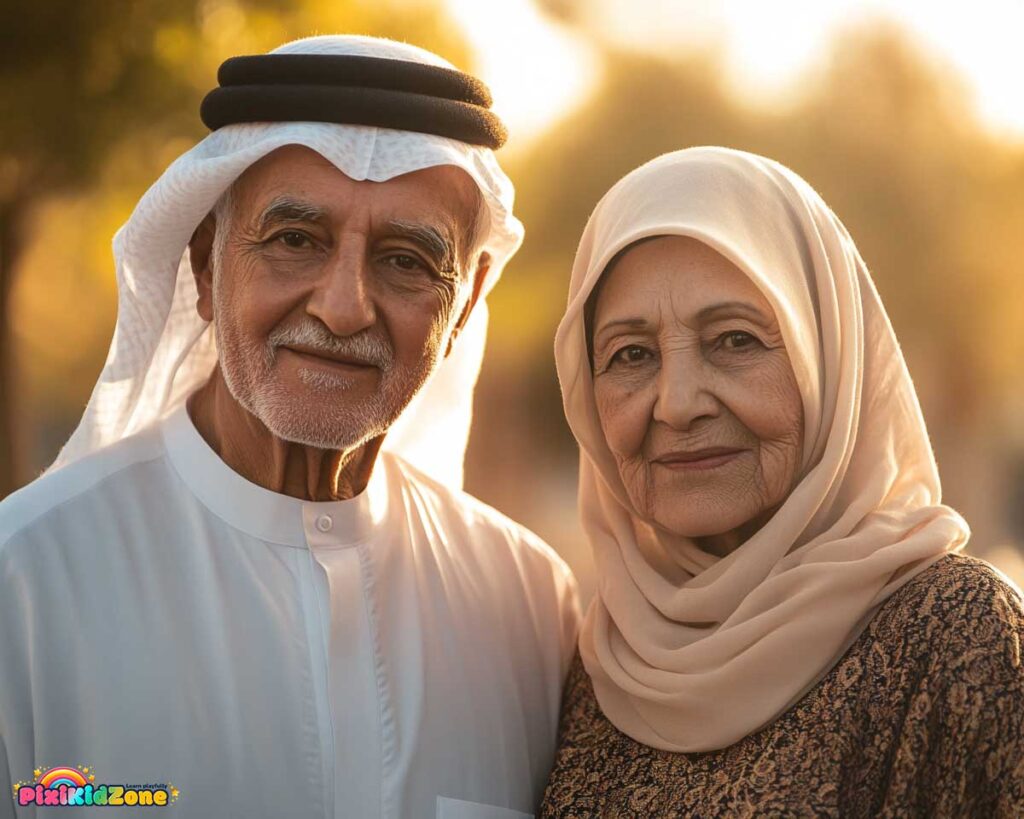
Arabic Word for Grandfather and Grandmother
Grandfather in Arabic – جد (Jadd)
In Arabic, the word for grandfather is جد (Jadd), pronounced as “Jadd”.
Grandfathers are highly respected in Arab families, often seen as the family’s wisdom keepers. They play an important role in passing down traditions, stories, and values. In some regions, affectionate terms like “Jiddi” (جدي) or “Sidi” (سيدي) are used to address grandfathers, reflecting deep respect and closeness.
Grandmother in Arabic – جدة (Jadda)
The Arabic word for grandmother is جدة (Jadda), pronounced as “Jadda”.
Grandmothers are often the heart of the household, known for their hospitality and love, especially when it comes to cooking! In some dialects, grandmothers are lovingly called “Teta” (تيتا) or “Jiddati” (جدتي). Their role extends beyond the family, as they often serve as the unifying force keeping multiple generations connected.
Arabic Word for Uncle and Aunt
Uncle in Arabic – عم (Am) / خال (Khal)
In Arabic, there are two different words for uncle, depending on whether he is from the father’s or mother’s side:
- عم (Am) – Paternal uncle (father’s brother), pronounced as “Am”
- خال (Khal) – Maternal uncle (mother’s brother), pronounced as “Khal”
Uncles often play a significant role in Arab families, acting as second fathers. The عم (Am), being from the father’s side, is often seen as an authoritative figure, while the خال (Khal) is traditionally known for being more affectionate and easygoing.
Aunt in Arabic – عمة (Amma) / خالة (Khala)
Just like with uncles, Arabic distinguishes between aunts from the paternal and maternal sides:
- عمة (Amma) – Paternal aunt (father’s sister), pronounced as “Amma”
- خالة (Khala) – Maternal aunt (mother’s sister), pronounced as “Khala”
Aunts, especially maternal ones (Khala), often take on a nurturing and caring role in a child’s life. The “Khala” is sometimes considered a second mother, while the “Amma” can hold a more traditional role within the extended family structure.
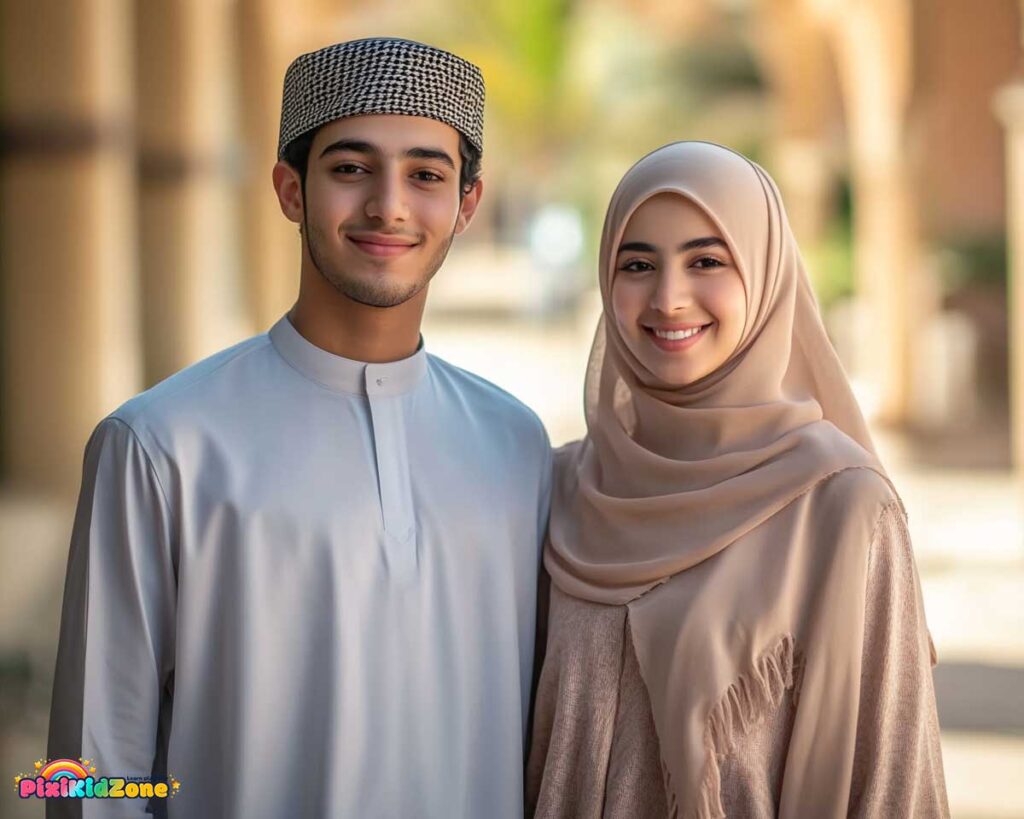
Arabic Word for Cousin (Male and Female)
Male Cousin in Arabic – ابن عم (Ibn Am) / ابن خال (Ibn Khal)
In Arabic, the word for male cousin depends on whether he is from the father’s or mother’s side:
- ابن عم (Ibn Am) – Paternal cousin (father’s brother’s son), pronounced as “Ibn Am”
- ابن خال (Ibn Khal) – Maternal cousin (mother’s brother’s son), pronounced as “Ibn Khal”
Cousins in Arab families are often as close as siblings, and in some cases, they even grow up together. Historically, in many Arab cultures, paternal cousins (especially Ibn Am) were considered potential marriage partners due to strong family ties and traditions.
Female Cousin in Arabic – بنت عم (Bint Am) / بنت خال (Bint Khal)
Similarly, the word for female cousin also changes depending on which side of the family she is from:
- بنت عم (Bint Am) – Paternal cousin (father’s brother’s daughter), pronounced as “Bint Am”
- بنت خال (Bint Khal) – Maternal cousin (mother’s brother’s daughter), pronounced as “Bint Khal”
Female cousins share a special bond in Arab families, often being treated as sisters. Just like with male cousins, Bint Am was traditionally seen as a close family connection, sometimes even a future spouse in arranged marriage traditions. However, in modern Arab society, cousin relationships are more about family unity and lifelong friendships.
Arabic Word for Grandson and Granddaughter
Grandson in Arabic – حفيد (Hafeed)
In Arabic, the word for grandson is حفيد (Hafeed), pronounced as “Hafeed”.
Grandsons hold a special place in Arab families, often being cherished and spoiled by their grandparents. In many cases, grandparents play an active role in raising and mentoring their grandsons, passing down traditions, stories, and wisdom.
Granddaughter in Arabic – حفيدة (Hafeeda)
The Arabic word for granddaughter is حفيدة (Hafeeda), pronounced as “Hafeeda”.
Granddaughters are equally adored, often receiving special attention from their grandmothers, who teach them family traditions, cooking secrets, and cultural values. In some Arab families, the first granddaughter even takes on a special role as the “little queen” of the household, bringing joy to everyone.
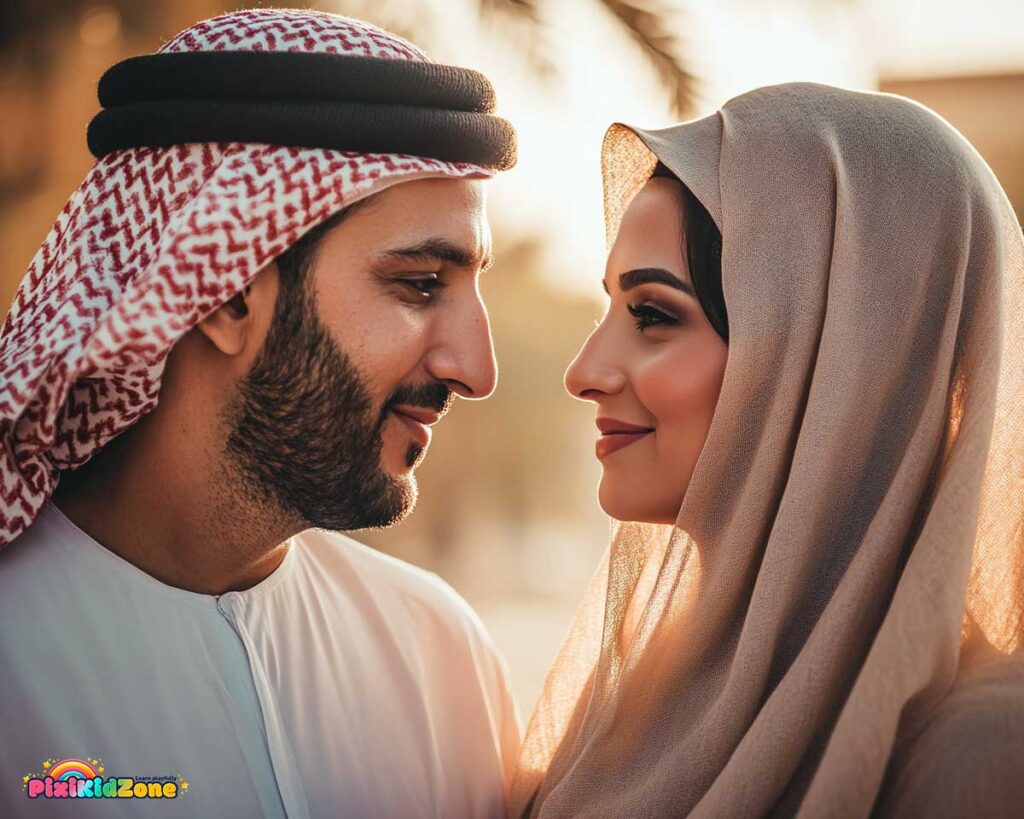
Arabic Word for Husband and Wife
Husband in Arabic – زوج (Zawj)
In Arabic, the word for husband is زوج (Zawj), pronounced as “Zawj”.
Marriage is highly valued in Arab culture, and the role of a husband extends beyond being a life partner—he is traditionally seen as the provider and protector of the family. The word “Zawj” can also mean “pair” in Arabic, emphasizing the idea of partnership and unity in marriage.
Wife in Arabic – زوجة (Zawja)
The Arabic word for wife is زوجة (Zawja), pronounced as “Zawja”.
Wives in Arab families hold an essential role, often seen as the heart of the home. In many traditional settings, the wife is responsible for maintaining family bonds, raising children, and preserving cultural traditions. The word “Zawja” comes from the same root as “Zawj”, reinforcing the idea that husband and wife are two halves of a whole.
Now You Know How to Address Someone in Arabic!
Learning Arabic family terms is not just useful for language learning—it’s a real cultural gateway. In Arab families, kinship ties mean much more than just blood relations—they shape social interactions, forms of respect, and even daily greetings.
If you ever visit an Arab family, you won’t be surprised to find that uncles and aunts have different specific titles, or that “Abu” and “Umm” (Father and Mother) are often followed by the name of their firstborn child. And if you ever ask, “How are these two related?”, you’ll quickly realize that it’s best to sit down and grab a notebook.
Now that you know the most important Arabic family words, maybe it’s time to try using them in a conversation. Who knows? The next time an Arab grandmother smiles at you, you might just know exactly how to address her. 😉
Hast du diese schon gelesen?
Möchtest du mehr über ägyptisches Arabisch erfahren? Finde heraus, welche Sprache die Ägypter tatsächlich sprechen! https://pixikidzone.com/de/blog/speak-the-egyptian-language-but-wait-what-language-do-they-actually-speak/
Neugierig, wie man auf Arabisch „Wie geht es dir?“ fragt? Lerne die höflichsten Formen! https://pixikidzone.com/de/blog/arabic-for-how-are-you-learn-how-to-ask-politely/
Hast du dich jemals über arabische Schimpfwörter gewundert? Entdecke sie vom marokkanischen bis zum Golf-Dialekt mit Aussprache! https://pixikidzone.com/de/blog/swear-words-in-arabic-from-moroccan-to-gulf-with-pronunciation/

 Deutsch
Deutsch



 English
English 简体中文
简体中文 Español
Español Português
Português Magyar
Magyar Русский
Русский Français
Français हिन्दी
हिन्दी العربية
العربية











